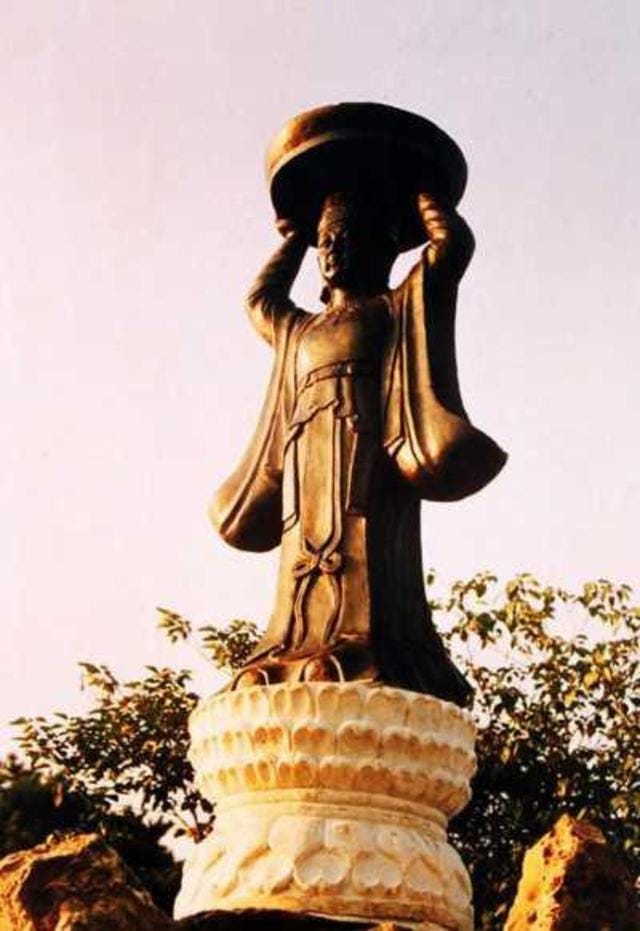More Than Just Ornamentation
It’s easy to look at ornamental language, decide that there’s nothing interesting there, and just move on.
And I can’t blame you for doing that with yesterday’s post. I mean, just look at what we read:
但見畫棟雕簷,珠簾繡幕,仙花馥郁,異草芬芳,真好所在也!正是:
光搖朱戶金鋪地,
雪照瓊窗玉作宮。
Before him, he saw painted beams and carved eaves, pearl curtains and embroidered drapes. This was a place where celestial blossoms breathed out majestic scents and rare herbs spread their smells. This really was an amazing place! Indeed:
The light glimmered on crimson gates, paving the ground with gold;
And snow-bright jade windows turned the palace to jade.
As usual, the interesting thing here is the implication of all this.
If you’ve been paying attention, you’re probably wondering why in the world the celestial realm on high is so opulent. What’s the point of the carefully painted beams and carved ornamental eaves? Who needs pearl curtains and embroidered drapes in the celestial realm? Who cares what the heavenly flowers smell like?
The truth is that these kinds of poetic comparisons and descriptions are very reminiscent of the visual excess of certain poets.
Take Li He (李賀) for example. Li He composed this poem to refer to a historic event in which Emperor Wu of Han had a bronze statue of an immortal holding a dew-collecting plate displayed in his own palace. The story is that the statue shed tears when the Emperor’s officers dismantled the piece to prepare it to be moved.
Centuries later, Li He composed this poem about the event:
《金銅仙人辭漢歌》
茂陵劉郎秋風客,夜聞馬嘶曉無跡。
畫欄桂樹懸秋香,三十六宮土花碧。
魏官牽車指千里,東關酸風射眸子。
空將漢月出宮門,憶君清淚如鉛水。
衰蘭送客咸陽道,天若有情天亦老。
攜盤獨出月荒涼,渭城已遠波聲小。
“The Bronze Immortal Leaves Han”
The Liu Lord of Maoling, a guest of the autumn wind,
At night, hears horses neigh; by dawn, no traces remain.Painted rails, cassia trees dangle autumn’s fragrance,
The thirty-six palaces now green with patina-moss.Wei officials drive the cart toward a thousand-mile journey,
At the east gate, piercing wind stabs the statue’s eyes.It carries only the Han moon as it exits the palace gates,
Remembering its lord, its clear tears flow like molten lead.Withered orchids line the road to Xianyang’s end.
If Heaven could feel grief, even Heaven would grow old.Alone, clutching its plate beneath the desolate moon,
The Wei River’s waves grow faint, the old capital now far.
There are a lot of parts of this poem that reflect the lines we read yesterday. For example, you have painted rails (畫欄) that hang out (懸, hang or suspend) the fragrance of autumn. Compare that with the painted beams and carved eaves (珠簾繡幕) and the sweet smelling celestial blossoms and rare herbs (仙花馥郁,異草芬芳) that we saw in yesterday’s description.
Li He describes the mossy green using the word 碧 (bì; literally “green jade”), as if the 36 palaces were actually part of the divine realm. This is almost a direct reflection of that 玉作宮 line in the poem we read yesterday, where the jade actually turns into the entire palace.
The divine is constantly associated with splendor and opulence, and it is constantly contrasted with the mortal world. In other words, the green jade is actually moss signifying the decline of the 36 palaces.
The key line here is the fifth line:
Withered orchids line the road to Xianyang’s end.
If Heaven could feel grief, even Heaven would grow old.
The real irony here, of course, is that this is a display of suffering because of attachment to luxury. In this case, it’s heaven itself that is suffering because of attachment.
The poem stuck in the middle of Jia Baoyu’s journey to heaven is heavily reminiscent of this Li He poem — and it’s reminiscent for a reason. It’s there to remind us that this “heaven” we are looking at is itself an illusion.



